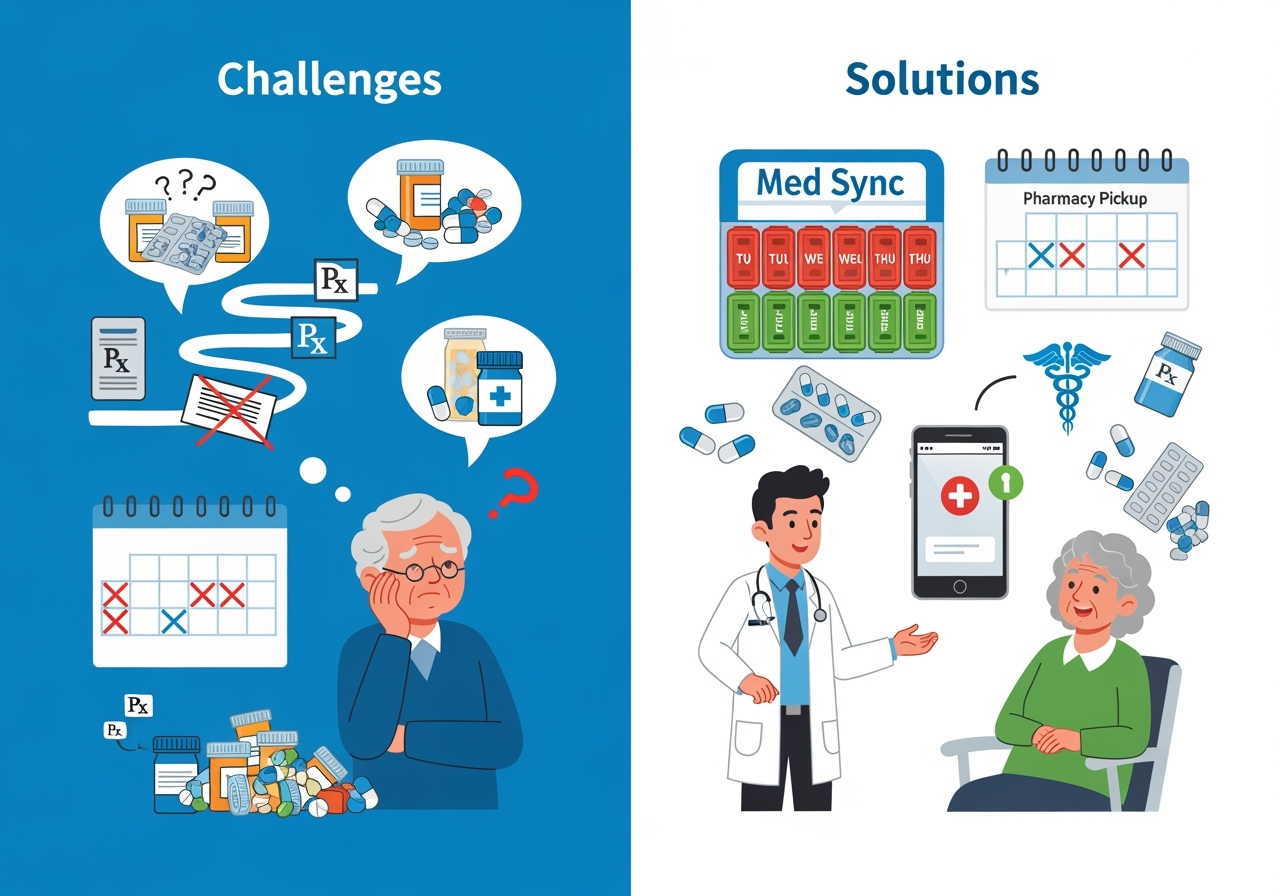Taking your medications on time may sound simple, but in reality, it’s one of the hardest parts of managing diseases. Many patients struggle with remembering doses, keeping track of refills, or even understanding how to take their prescriptions correctly. These challenges can get in the way of the patient’s recovery.
This is where Medication Synchronization (Med Sync) comes in. It’s a service where patients can pick up all their prescribed medication on a single day each month, without having to make multiple trips. This way, patients can stay on top of their medications.
In this blog, we’ll look at the challenges that patients face with medications and how prescription synchronization services can solve them.
What are the Challenges Patients Face with Medications and How Med Sync Can Solve Them?
Patients with chronic conditions often struggle with managing multiple prescriptions, endless refills, and frequent trips to the pharmacy. It’s no surprise that patients end up missing their doses or stop treatment altogether.
In fact, based on the National Library of Medicine report, about 50% of the patients don’t take their long-term medications as prescribed. This shows the need for a better patient medication adherence solution.
Here are some challenges that patients face with medications and how the med sync program can solve them:
-
Forgetting to Take their Medicines
Between busy schedules, family responsibilities, and work, it’s easy for patients to forget to take their pills. Skipping doses may not seem like a big deal at first, but it can reduce the effectiveness of treatment.
How Med Sync Helps: With a med sync program, patients don’t have to juggle multiple refill dates or run out of medicines unexpectedly. All prescriptions are ready to be picked up on the same day, which makes it easier for them to stick to their routine.
-
Making Multiple Trips to the Pharmacy
Many patients, especially those with chronic conditions, take several medications. This often means making multiple pharmacy visits every month, which can be really stressful and even expensive for those with transportation challenges.
How Med Sync Helps: Through pharmacy medication management, patients can cut down their pharmacy visits by picking up all their prescriptions in one monthly trip. This means fewer hassles, less travel, and more time for patients to focus on their health.
-
Running Out of Medicines Unexpectedly
Nothing is more frustrating than realizing you’re out of medication just when you need it. This can lead to missed doses, health setbacks, or even emergency situations.
How Med Sync Helps: With prescription synchronization services, the pharmacy works with the patient to ensure their medications never run out. By planning ahead and refilling everything on time, med sync removes this stress.
-
Managing Complex Medication Schedules
Some patients take several prescriptions with different dosages and timings. This can be confusing and overwhelming for the patients, leading to mistakes such as double-dosing or taking the wrong pill.
How Med Sync Helps: Med sync simplifies the process by organizing all prescriptions. With fewer refill dates to track, patients can focus on following their doctor’s instructions instead of worrying about refills. This makes treatment plans easier and safer to follow.
-
Feeling Alone in Medication Management
Managing multiple medications can sometimes feel isolating, especially for elderly patients or those without family support. Without guidance, it’s easy to make errors or lose motivation to stay on track.
How Med Sync Helps: A med sync program connects patients with their pharmacy team. These programs provide ongoing support, reminders, and a trusted point of contact, making patients feel cared for and not alone in their health journey.
Conclusion
Medication challenges are real, but they don’t have to stand in the way of a patient’s health. Whether it’s forgotten doses or running out of medication suddenly, they can be solved with the help of medication synchronization.
The med sync program is all about giving patients the confidence and support they need to manage their health successfully.
